I REMEMBER AND DEMAND. Recognise! Do not Keep Silent
Dedicated to the centennial of the Genocide committed in Ottoman Turkey in 1914-1923
By Irina Gasparyan
27 / 07 / 2015
http://nala4u.com
April 24 is the memorial day of the Armenian Genocide committed in the territory of Ottoman Turkey in early 20thcentury. April 24this observed annually. It is the day when the whole world remembers the victims of a monstrous extermination in the territory of the Western Armenia (now Turkey)
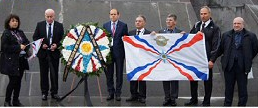
Assyrian delegation lays wreath during the official ceremony in Tsitsernakaberd
This year, 2015, was remarkable for it marked the 100 years since the atrocious crime against humanity. The European Parliament declared April 24 as the Day of Remembrance of the Armenian Genocide in the Ottoman Empire.This year special attention is paid to the occasion, and various events, like exhibitions, seminars, film screenings, performances and symposiums, will be held both in Armenia and all over the world throughout the whole year.However, the main events took place in Yerevan in April, 2015.On April 22-23, the State Commission Coordinating the Armenian Genocide Centennial Events, the National Assembly and the Ministry of Foreign Affairs of the Republic of Armenia held a Global Forum “Against the Crime of Genocide” in the frameworks of the events dedicated to the Armenian Genocide centennial. More than 600 parliamentarians, politicians, diplomats, scientists and prominent genocide scholars from 60 countries attended the Forum. The conference was dedicated not only to the Armenian Genocide but also to the fight against all the genocides in the world. April 23, the second day of the Forum is to be dedicated toParliament format, and a plenary session “Parliamentarians against Genocide” will take place. During the first panel“Evolution of the Prohibition of Crimes against Humanity in International Law” planned on April 22, the political and legal aspects of studying the crime of genocide, the process of the historical development of the concept of the prevention of“the crimes against humanity” in the international law and the possible perspectives of its development will be discussed
The second panel, “The Issue of Accountability, and Elimination of the Consequences of Genocide,” will focus on the issues of liability, restoration of rights and guarantees for not repeating, as well as on the existing positive experience and unresolved problems.For the first time on official invitation, the representative of the Assyrians and a member of Iraq Parliament, Yonadam Kanna,attended such a grandiose international forum with an Assyrian delegation consisting of 12 members from different countries, namely –Irina Gasparyan (Yerevan, Armenia)–memberof the Coordination Council on affairs of national minorities at the office of thePresident of Republic of Armenia, President of Federation of Assyrian organisations of Armenia “Khayadta”; Iosif Zaya (Moscow, Russia)–Candidate of Historical Sciences, the Regional national-cultural autonomy of Assyrians of Moscow, Member of Board of the Union of Diasporas of the Russian Federation, member of Council of Nationalities affairs at the Government of Moscow; Elias Yalda (Sydney, Australia)–General Secretary of Assyrian Universal Independent Activists Forum (AUIAF), Head of AshurSat TV; PavelSaiadov (Riga, Latvia)–Latvian Assyrian Cultural Centre; Ibrahim Afram (Stockholm, Sweden)–Assyrian Genocide International (Seyfo) Committee (AISC); Dr. Jamil Hanna (Stockholm, Sweden)–Assyrian Institute; Iskander Bulut (Stockholm, Sweden)–Assyrian Institute; Edgar Bitbunov (Moscow, Russia)–ROKPOA “Bneta”; JosephYacoub(Lyon, France)–professor of Political Science at Lyon Catholic University; Claire Weibel Yacoub (Lyon, France)–author of scientific works on the fate of the Assyrian Chaldeans and specialist on human rights; G. BircanOclin(Sarcelles, France)–Association of Assyro-Chaldeans of France; Mathieu DOMAN(Arnouville, France)–Association of Assyro-Chaldeans of France.The participation in the forum was crucial for us, given the need to preserve the Assyrian nation, as having suffered genocide at the beginning of the 20th century (1914-1923) our nation is still being eliminated in its historical homeland today. It is very important for us that our voice about the atrocious fact of eliminationof the Assyrian people in the territory of Ottoman Turkey was at last heard by the high representative members of the international forum “Against the Crime of Genocide”. Remarkably, the National Assembly of Armenia adopted a resolution on 24 March 2015, condemning the genocide of the Assyrians and Greeks in the territory of Ottoman Turkey between1915and 1923

The Assyrian delegation with Eduard Sharmazanov (the vice speaker of the National Assembly of Armenia) and thespeaker of the Parliament of Greece, Zoi Konstantopoulou
The Armenian Parliament’s recognition of the genocide of the Assyrians and the Assyrian delegation’s active participation in the international forum “Against the Crime of Genocide” held in the Armenian capital on the Armenian Genocide centennial is very important and timely asnow the Assyrians are struggling for their existence on their native land. It is not a secret that the ISIS militants are eliminating the heritage of the ancient nation.The Forum co-chairs were the famous French political figure Patrick Devedjian; Chairman of the Federation Council Commission of Russia, Nikolai Ryzhkov; and member of the British House of Lords, Baroness Caroline Cox(United Kingdom).The Forum was presided over by the leaderof the international programs of the law firm Getnick & Getnick, Luis Moreno–Ocampo (Chief Prosecutor of the International Criminal Court in 2003-2012), and the judge, Middle Temple organisation’s consultant, a trustee of the organisation Capital Cases Trust, Geoffrey Robertson (founder and head of Doughty Street Chambers, one of the UK’s leading human rights groups).The opening speech was delivered by the President of Armenia, Serzh Sargsyan. The Catholicos of All Armenians, His Holiness Karekin II, secretary of the Council of Europe, Thorbjørn Jagland, and the President of the International Association of Genocide Scholars, Daniel Feierstein, made speeches on the first day of the conference.Patrick Devedjian (France), Caroline Cox (UK) and Nikolai Ryzhkov (Russia) spoke during the working day. There were more speeches made by the participating parliamentarians and parliamentary delegations, including Yonadam Kanna, the representative of the Assyrians and a member of Iraq Parliament. He referred to the plight of the Assyrian people in his speech, saying that these ancient people are systematically persecuted.During the work of the Forum, Patrick Devedjian suggested the discussion and adoption of Yerevan Declaration based on the outcomes of the work of the symposium. He said “the Forum’s objective is to find ways of fighting efficiently against the repetition of such tragedies in the future.” He added that a document will be adopted at the end of the forum summing up all the issues included in event agenda as the reports voiced during the forum contained variety of ideas and proposals.The Assyrian delegation was also actively involved in the process of working on the document. The delegation’s credit is that the resulting document somehow did not include references on the genocide against the Assyrians and the Greeks. Such a shortcoming was a surprise for the Assyrian
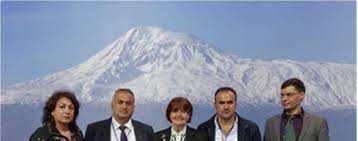
The Assyrian delegation with Baroness Caroline Cox (member and former vice speaker at the House of Lords,UK,sociologist and well-known human rights defender)
given the two days of discussion on the monstrous tragedy in the territory of Ottoman Turkey in 1915 against the Armenian, Assyrian and Greek people, mentionedin almost every report. Thanks to Irina Gasparyan, the President of Federation of Assyrian organisations of Armenia “Khayadta”, the issue of including the genocide against the Assyrians and Greeks into the final document was raised. The issue was supported not only by the entire Assyrian delegation, but also by Zoi Konstantopoulou, the speaker of the Greek parliament, and Eduard Sharmazanov, the vice-speaker of the National Assembly of Armenia. The participants of the forum “Against the Crime of Genocide” approved the final version of Yerevan Declaration, which was stated by the co-chair of the Forum, Baroness Caroline Cox at the end of the Forum. “We approve the proposed declaration,” she said.It is worth mentioningthat the other participants of the Forum were coming up to the Assyrian delegation to congratulate not only for the achievement, but also to highlight the Assyrians’ solidary and coordinated work during the Forum. Ph.D (History) Iosif Zaya gave an interview to the Armenian TV channel from the behalf of the Assyrian delegation. At the end of the Forum, the parliamentarians from all the countries in the world condemned the Armenian Genocide and highlighted the importance of preventing such kind of crimes against humanity in the future. Especially remarkable was the call of the former Chief Prosecutor of the International Criminal Court that Armenia must take up the role of the leader of the struggle against genocides, which was spoken about by many. In parallel with the Forum, presentation of stamps dedicated to the Centennial of the Armenian Genocide, “Genocide in Literature” books exhibition, scientific conference on “International Legal Issues on the Prevention of the Crime of Genocide and Responsibility”, and an ecumenical session “Churches against the Crime of Genocide: Human Life -God’s Gift” were held
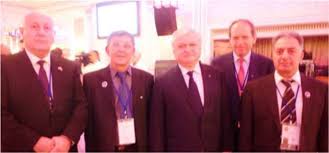
The Assyrian delegation with the Foreign Minister of Armenia, Eduard Nalbandyan
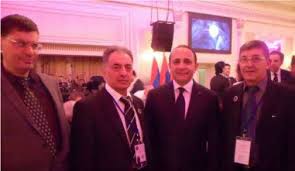
he Assyrian delegation with the Prime Minister of Armenia, Hovik Abrahamyan
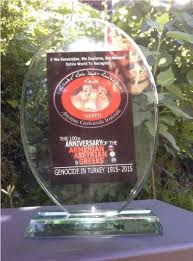
Souvenir from the Assyrian delegation
The Armenian citizens and all the guests of the country visited Tsitsernakaberd complex and put flowers to the eternal flame to pay tribute to the memory of now saint victims. On 24 April at 22:00, the traditional torchlight procession to Tsitsernakaberd started from the Republic Square. It is held every year by the Armenian Revolutionary Federation Dashnaktsutyun. The annual torchlight procession symbolises the struggle for the recognition of the Armenian Genocide. The head of the Central office of “Hay Dat” and the Political Affairs Office of the ARF Dashnaktsutyun, Kiro Manoyan, said that on the eve of the Armenian Genocide centennial (in 2015) the Armenian youth from all over the world united to declare that nothing ended with that date, but everything was just starting.Remarkably, the Assyrians’ participation in the torchlight procession has become a tradition, and the Assyrian flag was taken to the Memorial along with the 30-metre-long Armenian tricolour and the flags of the countries that have recognised the Armenian Genocide.The participation of the Assyrian delegation in the official ceremony of commemoration of the Armenian Genocide Centennial in TsitsernakaberdWreath from the Assyrian delegationThe traditional torchlight procession to TsitsernakaberdThe participants honoured the memory of the victims of the Armenian Genocide with a minute of silence before the beginning of the procession. They burnt the Turkish flag as a protest against Turkey’s policy of denial.The events held on April 24 for the Armenian Genocide Centennial served the main purposes set: raising the international awareness of the Armenian Genocide, forming public opinion and mobilising to condemn and fight against genocides as crimes against humanity. The Armenian Genocide centennial commemoration is not over with April 24 events, Vigen Sargsyan,Presidential Chief of Staffof the Republic of Armenia and the coordinator of events, told a press-conference, summing up the work done and speaking about the further action. He said the events held in many countries after April 24 came to prove that. “Political, sports, cultural events will be organised throughout the whole year,” he said and added that the websitearmeniangenocide100.org would go on operating with the same intensity, reporting about the many different events in all the corners of the world. The Armenian Diaspora took an active part in the events. Processions were held in Los Angeles, New York, Beirut, Paris, Tbilisi, Akhaltsikhe, Istanbul, Valencia, Jerusalem, Berlin, London, San Francisco, Kiev and Zaporozhye. Church services and commemorative events were held in Russian cities. April 24 was declared Armenian Genocide victims’ Remembrance Day in Russia. We hope that never and in no place in the world will genocide be committed again, and those responsible for the crimes against humanity will be punished. The meetings of the Assyrian delegates of the Global Forum “Against the Crime of Genocide” with the Assyrians in ArmeniaEven with the intense and busy schedule of the global socio-political forum “Against the Crime of Genocide” and other noteworthy events organised by the State Commission Coordinating the Armenian Genocide Centennial Events, the National Assembly and the Ministry of Foreign Affairs of the Republic of Armenia on April 22-24 in the frameworks of the events dedicated to the Armenian Genocide Centennial in Yerevan, the Assyrian delegation visited Assyrian villages , where events dedicated to the Centennial of the Armenian Genocide committed in Ottoman Turkey in 1915 were also held. The Assyrian delegation visited the village Verin DvinEvents, exhibitions, literary and musical compositions «I Remember and Demand” dedicated to the tragic events that took place at the beginning of the 20th century in the territory of Ottoman Turkey taking the lives of Armenian, Assyrian and Greek people, were organised in the villages VerinDvin, Arzni and Dimitrovo. The Assyrian delegation in ArzniThe meetings appeared to be very warm. The delegates could also take time to discuss the vital problems of the Assyrian community in Armenia with Arzni secondary school headmistress Sofya Simonovna and the headperson of the village VerinDvin, Lyudmila Petrova.The visit to the Assyrian Church of the East of Armenia in the village VerinDvin and the conversation with the Assyrian priest Nikodim Yukhanayev made an indelible impression.A particularly large-scale literary and musical composition “I Remember and Demand” was organised in the village Dimitrovo thanks to Mkhitaryan N. G., the Russian Language and Literature teacher. The Dimitrovo village high school’s headmaster Mkrtchyan G.M’s final speech became the concluding chord of the events, “We will never forget the villainies the Turkish authorities committed. The Armenian and Assyrian people suffered. But we must live, we know how to live, and it is our obligation to live to prove that we are an immortal nation.”Press-centre of the Assyrian Federation “Khayadta”Dimitrovo village school headmaster’s speech
From the behalf of the Assyrian delegation, Elias Yaldahanded souvenirs to the Prime Minister of Armenia, Hovik Abrahamyan,to the Minister of Foreign Affairs of Armenia, Eduard Nalbandyan,and to the speaker of the National Assembly of Armenia, Galust Sahakyan.On 23 April at 17:00, rite of canonisation of the Armenian Genocide victims was carried out in Echmiadzin, the residence of the Catholicos. It was a historical event; the last case the Armenian Apostolic Church carried out canonisation, was 500 years ago. Armenia’s President Serzh Sargsyan and over 80 representatives of the Christian Church attended the ceremony. Sharply at 19:15, bell striking in all the Armenian churches across the world began. The bells rang a hundred times in Yerevan to honour the centennial of the tragedy, and a nationwide minute of silence was observed in the country.The observance was followed by the rock band System of a Down concert in the Republic Square, Yerevan, under the slogan “Wake up the Souls.”On April 24, a ceremony in memory of the victims of the Armenian Genocide was held in Yerevan, and delegations from 60 countries, including Russia, were present at it. The flower forget-me-not became the symbol of the centennial. This flower has a symbolic meaning in all the languages –remember, not forget and remind. The symbol will be actively used throughout 2015The colours chosen represent the past, the tragedy of the Genocide, the present and the future. The five petals of the flower symbolise the five continents that gave shelter to the Armenian refugees who created Armenian communities there to form the Armenian Diaspora. At the beginning of the ceremony, a wreath emblazoned with forget-me-not, the symbol of the centennial, was taken to the memorial. Guard of honour was lined up in the memorial complex. Serzh Sargsyan, the President, and his wife welcomed the high ranking guests.All the Heads of Delegations put each a flower into the wreath to state that they remember the historical reality and support the Armenian people. Heads of four states attended the event –France, Russia, Serbia and Cyprus. The presidents came up with speeches in turn
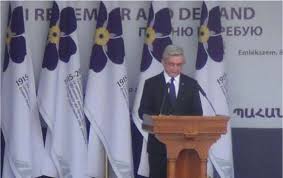
President of Armenia Serzh Sargsyan’s speech
The Armenian citizens and all the guests of the country visited Tsitsernakaberd complex and put flowers to the eternal flame to pay tribute to the memory of now saint victims. On 24 April at 22:00, the traditional torchlight procession to Tsitsernakaberd started from the Republic Square. It is held every year by the Armenian Revolutionary Federation Dashnaktsutyun. The annual torchlight procession symbolises the struggle for the recognition of the Armenian Genocide. The head of the Central office of “Hay Dat” and the Political Affairs Office of the ARF Dashnaktsutyun, Kiro Manoyan, said that on the eve of the Armenian Genocide centennial (in 2015) the Armenian youth from all over the world united to declare that nothing ended with that date, but everything was just starting.Remarkably, the Assyrians’ participation in the torchlight procession has become a tradition, and the Assyrian flag was taken to the Memorial along with the 30-metre-long Armenian tricolour and the flags of the countries that have recognised the Armenian Genocide
The traditional torchlight procession to TsitsernakaberdThe participants honoured the memory of the victims of the Armenian Genocide with a minute of silence before the beginning of the procession. They burnt the Turkish flag as a protest against Turkey’s policy of denial.The events held on April 24 for the Armenian Genocide Centennial served the main purposes set: raising the international awareness of the Armenian Genocide, forming public opinion and mobilising to condemn and fight against genocides as crimes against humanity. The Armenian Genocide centennial commemoration is not over with April 24 events, Vigen Sargsyan,Presidential Chief of Staffof the Republic of Armenia and the coordinator of events, told a press-conference, summing up the work done and speaking about the further action. He said the events held in many countries after April 24 came to prove that. “Political, sports, cultural events will be organised throughout the whole year,” he said and added that the websitearmeniangenocide100.org would go on operating with the same intensity, reporting about the many different events in all the corners of the world. The Armenian Diaspora took an active part in the events. Processions were held in Los Angeles, New York, Beirut, Paris, Tbilisi, Akhaltsikhe, Istanbul, Valencia, Jerusalem, Berlin, London, San Francisco, Kiev and Zaporozhye. Church services and commemorative events were held in Russian cities. April 24 was declared Armenian Genocide victims’ Remembrance Day in Russia. We hope that never and in no place in the world will genocide be committed again, and those responsible for the crimes against humanity will be punished
The meetings of the Assyrian delegates of the Global Forum “Against the Crime of Genocide” with the Assyrians in ArmeniaEven with the intense and busy schedule of the global socio-political forum “Against the Crime of Genocide” and other noteworthy events organised by the State Commission Coordinating the Armenian Genocide Centennial Events, the National Assembly and the Ministry of Foreign Affairs of the Republic of Armenia on April 22-24 in the frameworks of the events dedicated to the Armenian Genocide Centennial in Yerevan, the Assyrian delegation visited Assyrian villages , where events dedicated to the Centennial of the Armenian Genocide committed in Ottoman Turkey in 1915 were also
Events, exhibitions, literary and musical compositions «I Remember and Demand” dedicated to the tragic events that took place at the beginning of the 20th century in the territory of Ottoman Turkey taking the lives of Armenian, Assyrian and Greek people, were organised in the villages VerinDvin, Arzni and Dimitrovo
The meetings appeared to be very warm. The delegates could also take time to discuss the vital problems of the Assyrian community in Armenia with Arzni secondary school headmistress Sofya Simonovna and the headperson of the village VerinDvin, Lyudmila Petrova.The visit to the Assyrian Church of the East of Armenia in the village VerinDvin and the conversation with the Assyrian priest Nikodim Yukhanayev made an indelible impression.A particularly large-scale literary and musical composition “I Remember and Demand” was organised in the village Dimitrovo thanks to Mkhitaryan N. G., the Russian Language and Literature teacher. The Dimitrovo village high school’s headmaster Mkrtchyan G.M’s final speech became the concluding chord of the events, “We will never forget the villainies the Turkish authorities committed. The Armenian and Assyrian people suffered. But we must live, we know how to live, and it is our obligation to live to prove that we are an immortal nation
Press-centre of the Assyrian Federation ,Khayadta



